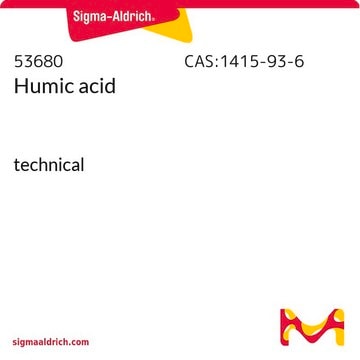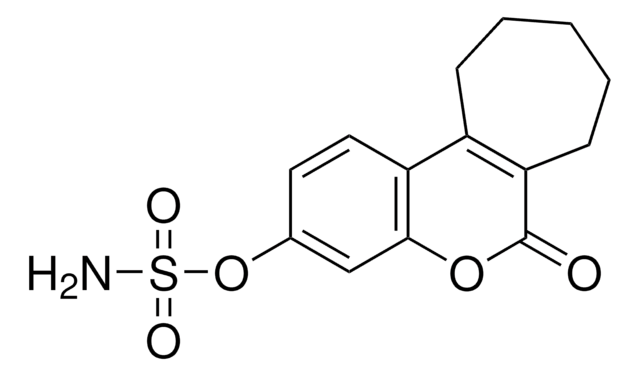H16752
Humic acid sodium salt
technical grade
Synonim(y):
Humic acid Na salts, Sodium humates, Sodium salts humic acids
Zaloguj sięWyświetlanie cen organizacyjnych i kontraktowych
About This Item
Polecane produkty
Szukasz podobnych produktów? Odwiedź Przewodnik dotyczący porównywania produktów
Opis ogólny
Humic acid possess excellent complexing ability with heavy metal. Humic acid sodium salt acts as a proxy for humic-like substances that were identified as a major component of the isolated organic matter in the atmospheric aerosol.
Humic acid sodium salt, also known as sodium humate is used to synthesize superabsorbents.
Humic acid sodium salt, also known as sodium humate is used to synthesize superabsorbents.
Zastosowanie
Humic acid sodium salt is suitable reagent used to study the hygroscopic growth of solid aerosol particles consisting of mixtures of ammonium sulfate, adipic acid and humic acid mixtures. It is suitable reagent used to study the phase transitions and hygroscopic growth of humic acid aerosols by Fourier transform infra-red (FTIR) spectroscopy and tandem differential mobility analysis (TDMA).
This page may contain text that has been machine translated.
Kod klasy składowania
13 - Non Combustible Solids
Klasa zagrożenia wodnego (WGK)
WGK 3
Temperatura zapłonu (°F)
Not applicable
Temperatura zapłonu (°C)
Not applicable
Środki ochrony indywidualnej
dust mask type N95 (US), Eyeshields, Gloves
Certyfikaty analizy (CoA)
Poszukaj Certyfikaty analizy (CoA), wpisując numer partii/serii produktów. Numery serii i partii można znaleźć na etykiecie produktu po słowach „seria” lub „partia”.
Masz już ten produkt?
Dokumenty związane z niedawno zakupionymi produktami zostały zamieszczone w Bibliotece dokumentów.
Klienci oglądali również te produkty
Synthesis and characterization of chitosan-g-poly (acrylic acid)/sodium humate superabsorbent
Liu J, et al.
Carbohydrate Polymers, 70, 166-173 (2007)
Sara P Azerrad et al.
Water research, 103, 424-434 (2016-08-06)
Removal of micropollutants from reverse osmosis (RO) brines of wastewater desalination by oxidation processes is influenced by the scavenging capacity of brines components, resulting in the accumulation of transformation products (TPs) rather than complete mineralization. In this work the iodinated
Qi Zhao et al.
Chemosphere, 256, 127021-127021 (2020-05-22)
The effect of gamma-irradiation doses of 0, 10, 100, and 500 kGy at the dose rates of 1 or 0.1 kGy/h on the molecular and chemical properties of humic substances (HS) were investigated using total organic carbon measurements, UV-Vis spectrometry, 13C nuclear magnetic
Tangui Léziart et al.
Environmental technology, 40(13), 1734-1743 (2019-02-20)
Chlorine is globally the most widely used chemical for water disinfection. Whereas disinfection efficiency is well known to depend on water pH and temperature, the effect of turbidity is less well studied. Although turbidity is measured online in most drinking
Hygroscopic growth and water uptake kinetics of two-phase aerosol particles consisting of ammonium sulfate, adipic and humic acid mixtures.
Sjogren S, et al.
Journal of Aerosol Science, 38(2), 151-171 (2007)
Nasz zespół naukowców ma doświadczenie we wszystkich obszarach badań, w tym w naukach przyrodniczych, materiałoznawstwie, syntezie chemicznej, chromatografii, analityce i wielu innych dziedzinach.
Skontaktuj się z zespołem ds. pomocy technicznej










